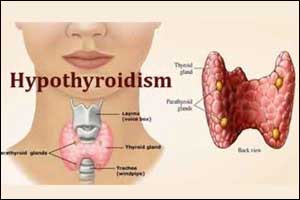- Home
- Editorial
- News
- Practice Guidelines
- Anesthesiology Guidelines
- Cancer Guidelines
- Cardiac Sciences Guidelines
- Critical Care Guidelines
- Dentistry Guidelines
- Dermatology Guidelines
- Diabetes and Endo Guidelines
- Diagnostics Guidelines
- ENT Guidelines
- Featured Practice Guidelines
- Gastroenterology Guidelines
- Geriatrics Guidelines
- Medicine Guidelines
- Nephrology Guidelines
- Neurosciences Guidelines
- Obs and Gynae Guidelines
- Ophthalmology Guidelines
- Orthopaedics Guidelines
- Paediatrics Guidelines
- Psychiatry Guidelines
- Pulmonology Guidelines
- Radiology Guidelines
- Surgery Guidelines
- Urology Guidelines
Elderly patients on Levothyroxine may have increased mortality

Subclinical hypothyroidism is a very common situation when thyroid function is not normal but is not defined as a disease.Researchers from Israel have found in a new research that treating some elderly people with levothyroxine may put them at increased risk of death The results have been presented at ENDO 2018, the 100th annual meeting of the Endocrine Society in Chicago, Ill.
"In patients who are 65 years of age or above with subclinical hypothyroidism and thyroid-stimulating hormone (TSH) <10 mIU/L (milli-international units per liter), treatment with levothyroxine is associated with significantly increased mortality," said lead study author Joseph Meyerovitch, M.D., professor and senior physician at the Jesse and Sara Lea Shafer Institute for Endocrinology and Diabetes of the Schneider Children's Medical Center of Israel in Petah Tikva, and Chief Pediatrician Medicine Wings, Community Division, Clalit Health Services, Tel Aviv, Israel
"Subclinical hypothyroidism, the situation when thyroid function is not normal but is not defined as a disease, is very common," he added. "Physicians should consider the results of the study before they begin treatment with levothyroxine in individuals 65 years of age and above who have subclinical hypothyroidism and TSH values under 10 mIU/L."
Meyerovitch and colleagues determined which patients 65 years or older with TSH levels between 4.2 and 10 mIU/L died during the years 2012 through 2016 (cases) and matched them with individuals who did not die during that period (controls).
The authors matched the patients according to age, gender, Charlson comorbidity index, TSH testing date, follow-up duration, and TSH quartile, and they compared the use of levothyroxine between the groups. They excluded all patients with known thyroid disease and those who had received anti-thyroid medications or glucocorticoids in the year before they were tested for TSH.
During the follow-up period, 419 people who died were matched with 1,558 people who did not die. Treatment with levothyroxine was linked with significantly increased mortality (hazard ratio = 1.19).
Factors associated with death included age, senile dementia, congestive heart failure, cerebrovascular disease, and chronic renal failure. Femoral fractures and atrial fibrillation after beginning to take levothyroxine were not more prevalent in individuals who died during follow-up.

Disclaimer: This site is primarily intended for healthcare professionals. Any content/information on this website does not replace the advice of medical and/or health professionals and should not be construed as medical/diagnostic advice/endorsement or prescription. Use of this site is subject to our terms of use, privacy policy, advertisement policy. © 2020 Minerva Medical Treatment Pvt Ltd